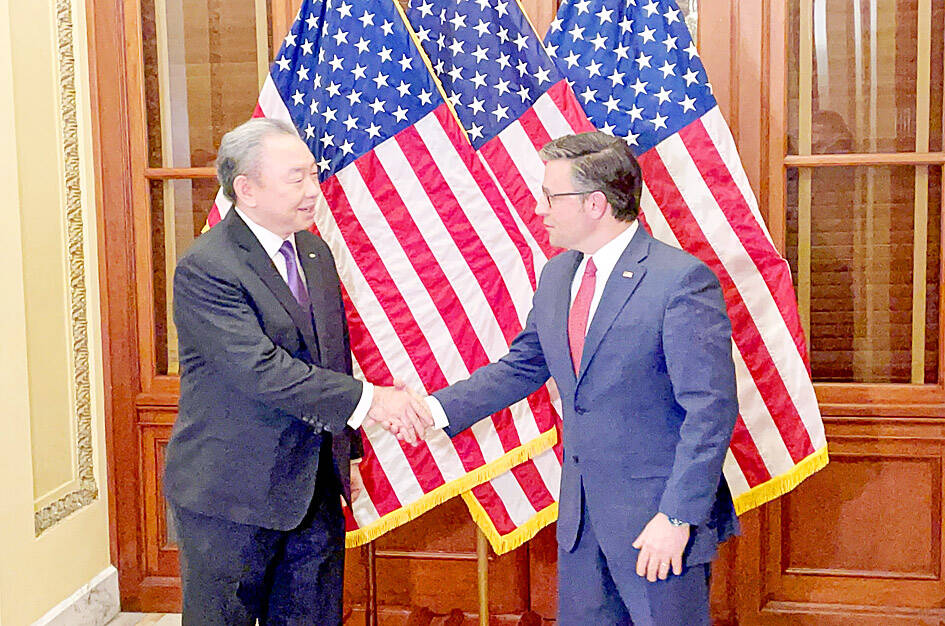The US stands with Taiwan, US House of Representatives Speaker Mike Johnson told Representative to the US Alexander Yui (俞大㵢) on Tuesday in the first official meeting between the two.
“We stand shoulder to shoulder with the Taiwanese people,” Johnson told reporters as he welcomed Yui to Washington before a half-hour, closed-door meeting.
It was the first public meeting between the two after Yui, a former envoy to the EU and deputy foreign minister, took up the post in Washington last month.

Photo: CNA
The diplomat filled the vacancy left by Hsiao Bi-khim (蕭美琴), who became the running mate of Vice President William Lai (賴清德), the Democratic Progressive Party’s presidential candidate in Saturday’s election.
Johnson became speaker in late October last year after weeks of debate in the Republican-led House, starting with the dumping of former speaker Kevin McCarthy.
“We certainly want to help in the defense of Taiwan, which is very important,” Johnson told reporters. “We want to deter the Chinese Communist Party and any military provocations.”
The US Congress “stands with our friends, and stands for democracy and the principles you all try to advance,” he said, adding that Taipei and Washington have an “important relationship and we all want to strengthen that.”
Yui thanked Johnson for his and the US Congress’ longstanding bipartisan support for Taiwan, in particular for Washington’s commitments to enhancing the nation’s security, safeguarding its democratic system and promoting a bilateral economic partnership.
Robust Taiwan-US ties are based on shared values such as freedom and democracy, and Yui looks forward to “further strengthen[ing] our rock-solid friendship,” he said.
Following the closed-door meeting, Yui told Taiwanese reporters on Capitol Hill that his visit was a “courtesy call” and that the two sides exchanged views on key issues.
Asked if Johnson asked about Taiwan’s presidential and legislative elections, Yui said the speaker hoped they would proceed smoothly.
Asked if he invited Johnson to visit Taiwan, Yui said he did not.
Johnson assured him that he was a longtime friend of Taiwan and stressed the bipartisan support for Taiwan in the Congress, Yui said.

CHAOS: Iranians took to the streets playing celebratory music after reports of Khamenei’s death on Saturday, while mourners also gathered in Tehran yesterday Iranian Supreme Leader Ayatollah Ali Khamenei was killed in a major attack on Iran launched by Israel and the US, throwing the future of the Islamic republic into doubt and raising the risk of regional instability. Iranian state television and the state-run IRNA news agency announced the 86-year-old’s death early yesterday. US President Donald Trump said it gave Iranians their “greatest chance” to “take back” their country. The announcements came after a joint US and Israeli aerial bombardment that targeted Iranian military and governmental sites. Trump said the “heavy and pinpoint bombing” would continue through the week or as long

TRUST: The KMT said it respected the US’ timing and considerations, and hoped it would continue to honor its commitments to helping Taiwan bolster its defenses and deterrence US President Donald Trump is delaying a multibillion-dollar arms sale to Taiwan to ensure his visit to Beijing is successful, a New York Times report said. The weapons sales package has stalled in the US Department of State, the report said, citing US officials it did not identify. The White House has told agencies not to push forward ahead of Trump’s meeting with Chinese President Xi Jinping (習近平), it said. The two last month held a phone call to discuss trade and geopolitical flashpoints ahead of the summit. Xi raised the Taiwan issue and urged the US to handle arms sales to

State-run CPC Corp, Taiwan (CPC, 台灣中油) yesterday said that it had confirmed on Saturday night with its liquefied natural gas (LNG) and crude oil suppliers that shipments are proceeding as scheduled and that domestic supplies remain unaffected. The CPC yesterday announced the gasoline and diesel prices will rise by NT$0.2 and NT$0.4 per liter, respectively, starting Monday, citing Middle East tensions and blizzards in the eastern United States. CPC also iterated it has been reducing the proportion of crude oil imports from the Middle East and diversifying its supply sources in the past few years in response to geopolitical risks, expanding

An Emirates flight from Dubai arrived at Taiwan Taoyuan International Airport yesterday afternoon, the first service of the airline since the US and Israel launched strikes against Iran on Saturday. Flight EK366 took off from the United Arab Emirates (UAE) at 3:51am yesterday and landed at 4:02pm before taxiing to the airport’s D6 gate at Terminal 2 at 4:08pm, data from the airport and FlightAware, a global flight tracking site, showed. Of the 501 passengers on the flight, 275 were Taiwanese, including 96 group tour travelers, the data showed. Tourism Administration Deputy Director-General Huang He-ting (黃荷婷) greeted Taiwanese passengers at the airport and